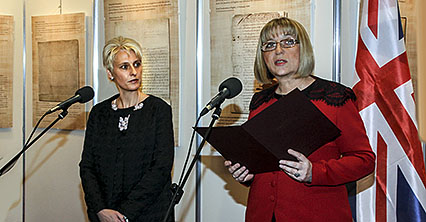
The Chairperson of the National Assembly, Tsetska Tsacheva, has opened the exhibition titled: “800 years since Magna Carta (The Great Charter) - a history of freedom”.
The exhibition was organised by the British Embassy to Sofia and presents the history and the legacy of one of the most significant legal documents.
Tsetska Tsacheva has noted that Magna Carta, as a legal document, was the starting point in the fight for rights and freedoms throughout the centuries and an expression of the mankind’s aspirations towards dignity and justice. In her inaugural address she added, the above legal document laid the foundations of the civilization based on constitutional rules. Magna Carta had declared the absolute power of the Law above all and had proved that Law and Peace are inseparable, as are War and Injustice.
Tsetska Tsacheva stressed that in the past 8 centuries Magna Carta had become the legend and symbol of freedom achieved through the rule of law. In her words in the Tarnovo Constitution of Bulgaria, which laid the foundations of the democratic principles of the newly established state, one could find a strong resonance of Magna Carta.
The event was attended by the Ambassador of Great Britain, H.E. Emma Hopkins. She said Magna Carta is the bright symbol of lawfulness, freedom and democracy.
Katya Todorova, Deputy Minister of Foreign Affairs of the Republic of Bulgaria, stated the importance of the legal document at the present is that it continues to serve as an inspiration for the making of many political decisions of the institutions. Magna Carta lays down principles, thanks to which every human being could enjoy a dignified life and societies could enjoy security and well-being.
800 years ago, on June 15th 1215, a peace agreement, known as Magna Carta, was signed. The aim of the agreement had been to stop the bloody civil war in England. Parties to the contract were King John and 36 representatives of the nobility and the high clergy, led by Archbishop Stephen Langton. The accord itself is a Declaration delivered by the King by which he grants his subjects important rights and freedoms and declares serious limitations to his own power.

- 22/04/2021
The Parliament imposed a moratorium on concessions, real estate deals and appointments pending the election of a new cabinet or caretaker government - 16/04/2021
By 156 votes “in favour”, the National Assembly accepted the resignation of the Council of Ministers with Prime Minister Boyko Borisov - 15/04/2021
Speech by Mrs. Iva Miteva upon her election as a President of the 45th National Assembly - 15/04/2021
The Member of Parliament Iva Miteva was elected President of the 45th National Assembly - 15/04/2021
The Members of the 45th National Assembly were officially sworn in - 03/03/2021
The President of the National Assembly Tsveta Karayancheva and MPs attended the solemn fireworks-retreat on the occasion of the Liberation of Bulgaria - 03/03/2021
Every Bulgarian should preserve and honour the memory of those glorious ancestors, thanks to whom Bulgaria exists today, said the President of the National Assembly Tsveta Karayancheva in Gabrovo - 03/03/2021
Today we are on Shipka to pay our respects to all the heroes who sacrificed their lives for freedom, said the President of the National Assembly Tsveta Karayancheva after climbing Shipka Peak together with young people from all over the country - 02/03/2021
The Vice-President of the National Assembly Valeri Simeonov received an award from the Bulgarian Republican Self-Government in Hungary - 26/02/2021
The Parliament adopted at second reading amendments to the Measures Against Money Laundering Act
 Български
Български English
English